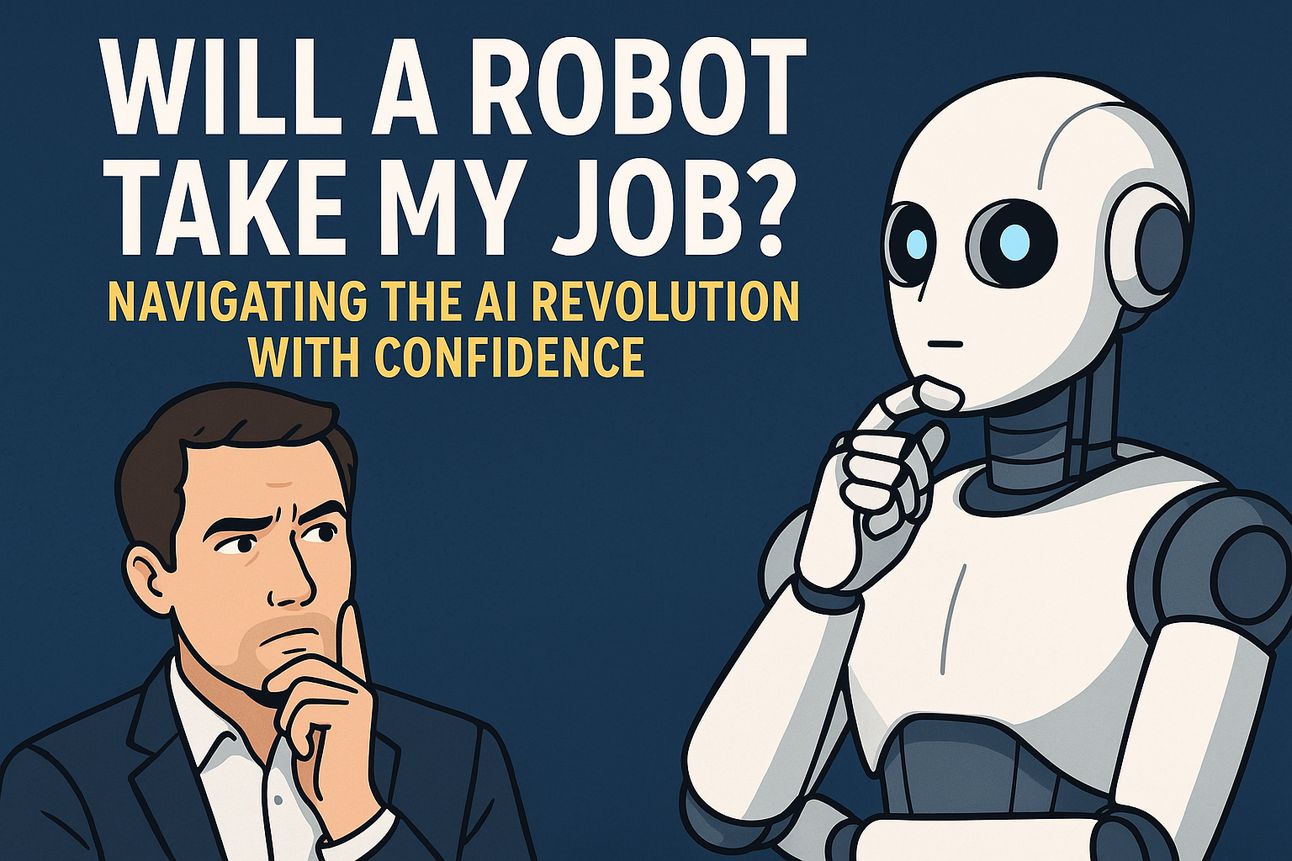- MakeMeExpert
- Posts
- Will AI Take My Job?
Will AI Take My Job?
Navigating the AI Revolution with Confidence

The Big Question Everyone's Asking
You're sipping your morning coffee, scrolling through headlines, and boom — another article warns that AI is taking over jobs. If you're anything like most people, a chill might run down your spine. "Wait… will my job be next?"
It’s a fair question. After all, we now live in a world where chatbots answer customer queries, AI agents schedule meetings, and LLMs (Large Language Models) write essays and marketing copy. But before you panic, take a deep breath. The future of work isn't about robots replacing humans — it’s about humans working smarter with AI.
AI, ML, Agents, and Other Buzzwords — What Do They Mean?
Let’s break it down.
AI (Artificial Intelligence) is technology that can simulate human intelligence. It can learn, reason, and even make decisions. ML (Machine Learning) is a type of AI that learns from data and improves over time — like how Netflix learns what you like to watch.
Agents are automated tools that perform tasks for you. Think of them as digital assistants. Chatbots? You’ve definitely chatted with one while ordering food or resolving an issue online. And LLMs like ChatGPT? They’re advanced language tools that can write, translate, summarize, and more.
Now that we’ve demystified the lingo, let’s explore what this means for your job.
The Anxiety Is Real — And Totally Valid
AI has gone from sci-fi to reality in record time. We’ve seen it write poems, diagnose diseases, and even code websites. So it's understandable if you're thinking: “Is there any job it can’t do?”
But here’s the thing: anxiety is normal when facing change. The industrial revolution sparked similar fears. So did the invention of the internet. But those who adapted didn’t just survive — they thrived. AI isn’t the end of jobs — it’s the beginning of new ways to work.
Let’s Talk Jobs: What’s Vulnerable and What’s Valuable
Not all jobs are equally affected. AI is especially good at tasks that are repetitive and rule-based. So yes, roles like:
Data entry clerks
Basic customer support
Simple bookkeeping
...are the first on the automation list.
Take the example of Sarah, who used to manually input invoices into spreadsheets. Now, her company uses an AI-powered system that scans, reads, and logs invoices automatically — in seconds. But instead of losing her job, Sarah shifted to auditing and spotting anomalies, a higher-value role.
So while tasks may change, the role can evolve.
The Human Edge: What AI Still Can’t Replace
Let’s be clear — AI isn’t human. It doesn’t feel. It doesn’t understand context the way you do. It doesn’t build relationships or solve complex problems creatively.
Jobs that require:
Empathy (e.g., therapists, nurses)
Creativity (e.g., artists, marketers)
Critical thinking (e.g., managers, analysts)
Leadership (e.g., team leads, entrepreneurs)
… are safe and even growing.
Consider Ravi, a high school teacher. With the help of AI-powered tutoring tools, he now gives personalized assignments while spending more time mentoring students — something no machine can replicate.
AI as Your Teammate, Not Your Rival
What if we stopped thinking of AI as a competitor and started seeing it as a co-worker?
Designers use AI tools like Canva’s Magic Design to brainstorm layouts.
Writers use LLMs to overcome writer’s block.
Sales teams use AI agents to auto-schedule meetings, saving hours each week.
Priya, a social media manager, uses a chatbot to draft replies for FAQs, which she then personalizes. This allows her to focus on community engagement and strategy. AI didn’t replace her — it freed her to do the more meaningful work.
What to Learn to Stay Ahead (And What to Let Go Of)
Here’s the good news: You don’t need to learn how to code or build an LLM to future-proof your career. You just need to be willing to evolve.
Learn:
How to use tools like Notion AI, ChatGPT, or Canva AI
Basics of AI/ML (there are tons of free YouTube videos)
Soft skills: communication, emotional intelligence, collaboration
Let go of:
Thinking “this is how we’ve always done it”
Fear of technology
Relying only on technical skills without adaptability
Manoj, an accountant, started using AI to auto-generate reports. He now spends his time analyzing trends and giving strategic financial advice. He didn’t get replaced. He got promoted.
New Jobs AI Is Creating (Yes, Really!)
Did you know AI is actually creating jobs we hadn’t heard of 5 years ago?
Prompt engineers who craft inputs for LLMs
AI ethicists who ensure fair and responsible use
Conversational designers who build chatbots with human-like tone
Data curators, AI trainers, human-in-the-loop specialists
Anjali, a copywriter, now works as a prompt designer. Her job? Training AI to write in a specific tone. Not only is it fun and creative, but it also pays better than her previous gig.
Final Thoughts: You're Not Being Replaced — You're Being Reimagined
Let’s go back to the original question: “Is my job safe?”
The answer: Your job may change. Your skills may evolve. But your value? That’s timeless.
What matters isn’t avoiding change — it’s embracing it. AI isn’t here to erase you. It’s here to elevate you.
The future isn’t about robots taking over — it’s about humans and machines doing better work together.
So don’t fear the future. Shape it.
✅ Key Takeaways:
AI is automating tasks, not eliminating people
Jobs relying on empathy, creativity, and judgment are safer
AI tools can boost your productivity and creativity
Learn to work with AI — not against it
Stay curious, stay flexible, stay human